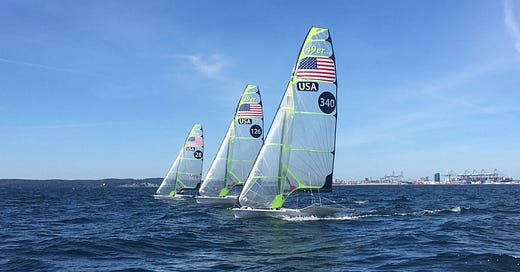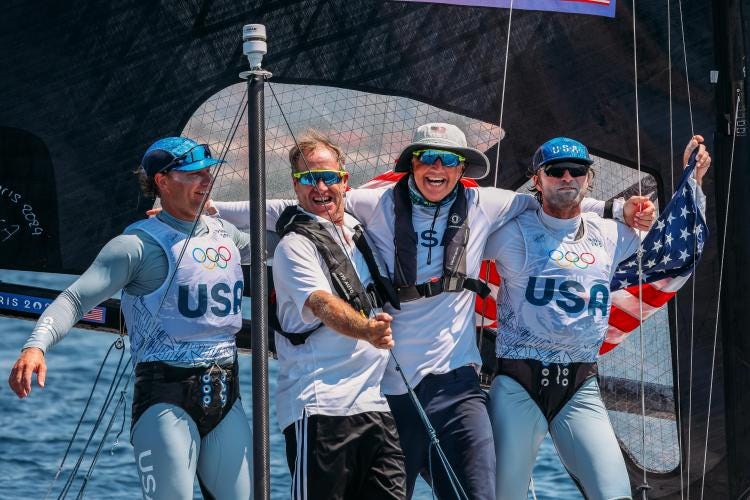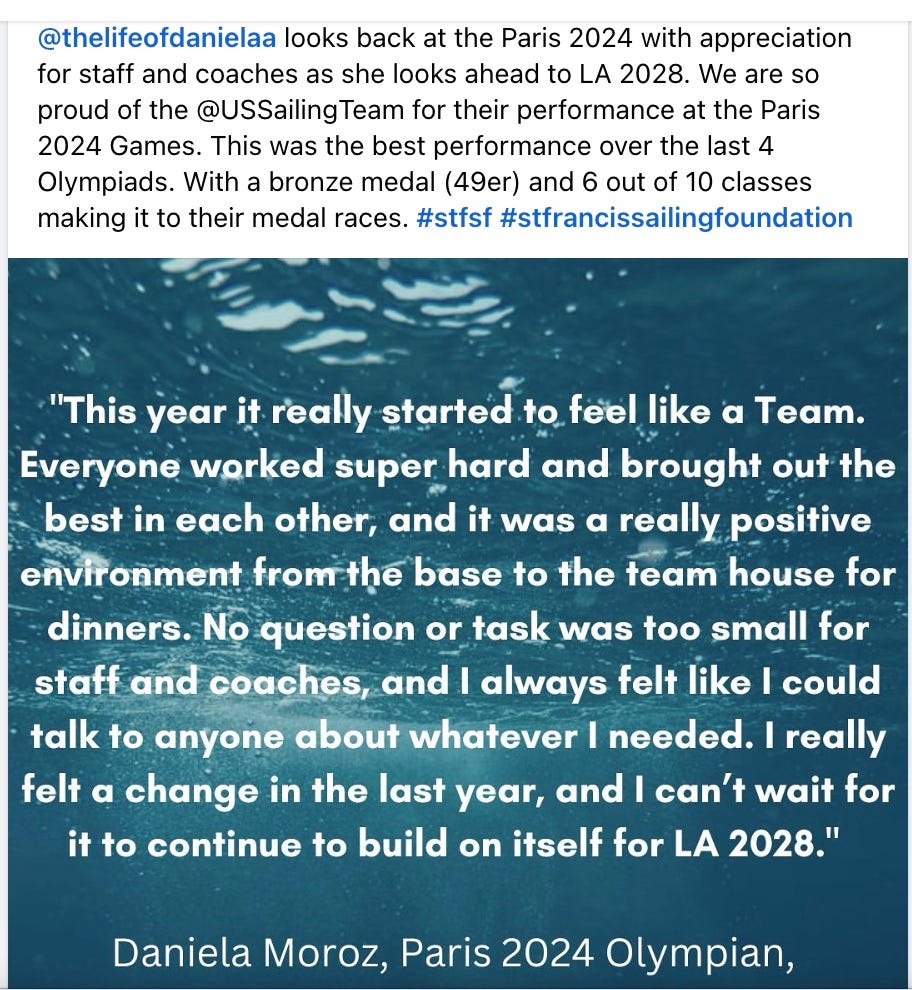Mark Asquith - US Sailing Team 49er Squad Coach
The recent success of the U.S. 49er squad, led by Mark Asquith, highlights the importance of a strategic, long-term coaching approach that emphasizes consistency, team cohesion, and shared goals.
I recently met Mark Asquith to discuss and reflect on the bronze medal Hans Henken and Ian Barrows won at the 2024 Olympics. We discussed Mark’s approach to coaching as the U.S. Sailing 49er Class Squad Coach. Over the past seven years, Mark has molded a tight-knit team that has helped bring the United States back to the upper levels of 49er success, reminiscent of the strong performances the U.S. Team saw back in 2000.
Mark, who sailed with the British 49er squad in the late 1990s and early 2000s, transitioned into coaching in 2012, starting with the Bermudian team and later working with the Canadian team. His wealth of experience in the 49er class and high-performance coaching knowledge have been a significant asset to the U.S. program since he joined in 2017.
Mark discusses the challenges and struggles the United States faced after the 49er team failed to qualify the country for the 2020 Tokyo Olympics. He emphasizes the importance of following a clear, long-term plan, maintaining consistency, and the dedication of the sailors. According to Mark, one of the key elements of turning things around was instilling the understanding that success wasn’t just about individual performance but about working cohesively as a team. His role as a coach was to guide the sailors toward this mentality, showing them that their best way forward involved collaboration, mutual support, and shared goals rather than focusing solely on individual efforts. This approach helped build the foundation, eventually leading to their bronze medal success at the 2024 Olympics.
Chris Mussler, in an article for Sailing World, wrote about the 49er squad at the US Olympic Trials:
“The top three teams in the standings had traded places in the top 10 on the world stage for three years. They had trained together and qualified the U.S. for the Games this past summer in the Netherlands. All three pairs had swallowed the bitter pill of missing country qualification in the 49er class for the Tokyo Olympics. Now (final day), nearly tied on points for a week, they had only one goal—to beat one another.
What transpired during that grueling series in Miami was the culmination of nearly a decade of dedication by three teams collectively aspiring to reach their peak abilities and one day make it to the Olympics. The photos on land after the final races in Miami revealed a depleted group of sailors, friends, and competitors who represented the first true medal hopes for the U.S. in the 49er since the early 2000s."
Talking with Mark reinforces the significant difference in the skill set required for a squad coach versus coaching an individual athlete. Not all good coaches possess the ability to manage a team successfully. Mark exemplifies what it takes to be an outstanding squad coach, combining experience, attitude, demeanor, commitment, and tireless dedication. He ensures that each team member receives the support they need to perform at their best while contributing as a valued team member. His ability to balance individuals' needs with the squad's success sets him apart as a truly exemplary coach.
Mark’s method of building a tight-knit, competitive squad has proven effective, with the bronze medal at the 2024 Olympics serving as a testament to this.
With the LA 2028 home Olympics on the horizon, the U.S. has a unique opportunity to build on this momentum and continue strengthening its presence on the international stage. Looking even further ahead to the 2032 Brisbane Olympics, the hope is that the U.S. will not only contend but aim for gold medals across multiple classes. By focusing on consistent development, collaboration, and a team-oriented mindset, the U.S. can once again become a dominant force in Olympic sailing.
John Bertrand:
Today, we’re excited to talk with Mark Asquith, the US Sailing 49er Squad Coach since 2017. He’s renowned for his work with the 49er squad and impactful coaching philosophies. We’ll discuss Mark’s journey from junior sailor to Olympic contender, his transition into coaching, and the philosophies that have led to his sailors’ many successes, particularly at the Paris 2024 Olympics.
We’ll also learn how he prepared his team for the Olympic regatta and get his outlook on the future of the US Sailing 49er squad. Welcome, Mark, and thank you for joining us.
Mark Asquith:
Thank you, John. I’m looking forward to this.
John Bertrand:
So, I want to start with something a little different. As a coach, I know that we carry the aspirations, hopes, and dreams of the sailors we coach. How did it feel waking up the morning after the medal race knowing your sailors had won the bronze medal?
Mark Asquith:
Wow, I’m not quite sure how to describe it. There was so much going on at that time. Other people were still racing, and we had just completed our races and won the medal. We were busy with everything—there were sore heads, too! Unfortunately, you don’t get the time in that moment to stop and reflect on what’s been achieved. In the Olympic environment, it’s nonstop, even after the racing ends. Other US sailors were still competing, so there wasn’t any time to reflect on or relish the accomplishments.
It sinks in a few days later when you can sit down with the team in a more relaxed environment and talk through what was accomplished. It takes a bit of time to process it fully.
John Bertrand:
Congratulations on that success. Could you share a little about your personal life? How do you balance home life with your coaching career?
Mark Asquith:
Well, I’m married with two great lads; one’s ten and the other’s eight. They’re also starting to find their path in sailing, so life at home is just as busy as it is when I’m away coaching.
John Bertrand:
Can you tell us how you got into sailing? Where did your journey start?
Mark Asquith:
I started sailing a little late compared to some others. I was about 11 or 12, enjoying club sailing until I was 13 or 14. Then, someone at the club mentioned this international racing scene, and I was hooked. We didn’t have the internet or YouTube to show us what was happening worldwide, so it was all word of mouth.
John Bertrand:
Did you start in a single-handed class at your local club, or did you jump straight into a double-handed?
Mark Asquith:
It was at the local club. My first boat was a Mirror dinghy, an old wooden-style boat with a gaff rig. But I quickly got into asymmetric sailing, crewing for someone at the club. That opened the door for me to crew in double-handed boats.
John Bertrand:
Was there any particular coach or mentor who inspired you early on, especially as you began to see Olympic sailing as a potential career path?
Mark Asquith:
I had a good mate, Matt Howard (GBR Finn squad coach of 2016 Gold medallist Giles Scott), who was key in guiding me. During our bus rides to school, he started painting a picture of the Olympic world. Those conversations opened my eyes to what Olympic sailing was all about.
John Bertrand:
At what point did you join the British Sailing Development program?
Mark Asquith:
Getting into the British program was tough. It was all based on results. You didn’t get in unless you hit specific performance markers at critical regattas. It took me a long time to reach those standards and finally be accepted.
Early in my career, I made the shift from helming to crewing. I initially helmed the 49er in a campaign, but that was in the early days. Afterward, I moved to crewing, first with Chris Draper for a season and then with Paul Brotherton around 2002-2003. That transition quickly propelled me to the front of the fleet. I was incredibly fortunate to sail and crew for both Chris and Paul. Every day brought new learning experiences for me.
Jumping into the 49er fleet was a giant leap, as it was my first Olympic campaign quad, fully committed to Athens. We hit some significant milestones, including medaling at the World Championships and the pre-Olympics in 2003. However, we ultimately finished second for the Athens Olympic slot. That experience was a tough lesson in the brutality of Olympic competition.
John Bertrand:
In the U.S., it’s not quite that way. It’s been a more open system where the priority was developing interest and getting the numbers. What’s your take on that approach?
Mark Asquith:
It’s a bit of a chicken-and-egg scenario. In Britain, it was clear—you knew what results you needed to achieve to get into the program. It made you self-coach and reach out to anyone who could help. There was a certain drive and hunger you had to have.
John Bertrand:
What were the biggest lessons you learned as a competitor?
Mark Asquith:
One of the biggest lessons I learned, especially about myself, was how much I needed to change my mindset. I used to see sailing as a social activity, and my balance between socializing and professionalism wasn’t right. I enjoyed the social side of it, but if I wanted to achieve at the highest level, I had to step up my professionalism.
Sparky (Stephen Park), the Performance Director at the time, pulled me aside one day and gave me a reality check. He made it clear that I had to choose—did I want to be a great social sailor, or did I want to be a professional, an Olympic-level sailor? That moment was pivotal. It wasn't harsh, but it was direct, and I knew I had to commit fully to the professional path if I wanted to succeed. There are only so many opportunities, and you can’t afford to waste time figuring it out.
That conversation helped clear my mind and solidify my decision to pursue a professional career in sailing. The shift in focus changed how I approached my development and how others saw me. It opened doors and created more opportunities by being seen as a serious athlete.
Since then, I've found myself in similar situations where I had to have tough conversations with sailors I was coaching or mentoring. Sometimes, being direct is necessary, just like Sparky was with me. It’s part of the sport; sometimes, you must push people to decide which path they want to follow.
John Bertrand:
And you indeed carried that drive into your coaching career. Let’s talk about coaching the US Sailing 49er squad. You’ve been with the team since 2017, and Hans Henken and Ian Barrows recently won a bronze medal at the Paris 2024 Olympics. What was it like coaching them through that campaign?
Mark Asquith:
It’s been an incredible journey with them and the squad. We always had a plan which kept us on track. When I started with the team, we weren’t even making gold fleets at international events. But we built a strong foundation over time, focusing on progress and sticking to our goals.
We always started with a clear plan, focusing on working with the resources we had and setting realistic goals along the way. The key was constantly assessing whether we were staying on our own path and hitting the objectives we had set. That approach kept the team engaged and motivated, even when things didn’t go as expected, like missing out on qualifying for the Tokyo Olympics. By sticking to the program we set early on, the squad worked tightly together, supporting and pushing each other.
One of the most important aspects of that squad dynamic was embracing collaboration, even if it wasn’t the most natural mindset for everyone. You can’t fear the person next to you—instead, you have to treat them as friends who will help you improve. That mentality was crucial to the squad’s strength.
John Bertrand:
There was a lot of buzz around the U.S. 49er squad’s training methods, especially the exercises you ran, which Hans and Ian credited with contributing to their success. Can you talk about how you mentally prepared them for the Olympics?
Mark Asquith:
One thing we focused on was managing pressure and staying calm when behind. We’d run drills where the sailors would have to claw their way back from the back of the pack. This mindset of not panicking and staying focused played a considerable role during the Olympic trials and, ultimately, at the Games.
John Bertrand:
Can you touch on the team’s preparations for the Olympic regatta?
Mark Asquith:
The first thing we did was establish a calendar that worked for everyone. It fit with personal schedules and allowed enough time for the necessary training in Marseille. This calendar was something we all believed in. Once that was in place, we periodized our training, focusing on specific objectives during each block.
A critical decision was not to overload ourselves with regattas. For instance, we deliberately skipped the Palma Regatta to avoid burnout. We didn’t adopt the mentality, “We’ve qualified for the Games; now we need to sail every single day.” Instead, we maintained a balanced approach. We continued working closely with our American partners while maintaining a strong European group to keep us in good shape.
We worked closely with the Irish and Dutch teams, bringing tremendous value to our training, albeit in slightly different ways. Together, we formed a strong squad, confident in our ability to train independently from other groups. This collaboration allowed us to focus on what was needed to be fast, race well, and navigate the course effectively. We trusted the process, knowing our group was hitting the right marks to prepare for high-level competition.
Video: more from Mark about the most crucial aspect of his team’s preparation and his close relationship with his sailors.
John Bertrand:
Can you describe the medal race?
Mark Asquith:
Which one? There were three of them for us.
John Bertrand:
Yeah, the final one.
Mark Asquith:
Well, from the coachboat perspective, we were locked in a box. We couldn’t see the start line clearly, so we had no idea who was over (at the start), who wasn’t, or what exactly was happening. We saw some boats returning, but the Croatians continued up the course. At that point, there were so many ifs and buts—until halfway up the first beat when the Croatians were pulled out. That’s when we realized, “This is on.”
The excitement really started to build then. We could see the boats rounding the marks, staying tight with the Swiss. It was a close race, especially coming into the leeward gate where small splits were happening. You could spot who the fast sailors were in those conditions as they chased down the lead. From our end, we were running the numbers, playing out the math, and wishing them every ounce of speed we could.
John Bertrand:
One last thing: With the upheaval caused by the removal of the team Director and his coaches, who left in early 2023, it’s apparent that his replacement, Marcus Lynch, has had a significant positive impact on the culture and operations of the team. It seemed like the team was cohesive and tight in Marseille, with everyone supporting each other. Like other team members who have posted similar expressions of gratitude for the US Sailing Team, Daniela Moroz, the U.S. woman’s Formula Kite competitor, expresses her thoughts in a social media post.
Mark Asquith:
Absolutely. Throughout the Games, it was eye-opening for everyone who experienced it. I think it was the tightest the U.S. team has felt in years. It was incredible to see—the support from staff, the extra members, the additional help—everyone was fully engaged. The atmosphere during those two weeks showcased how powerful the U.S. team can be when everyone is fully aligned and supporting each other.
You wish that level of strength and cohesion had been present throughout the entire quad, not just in the lead-up to the Games. Having even half of that unity and support over the four years of preparation could have made a significant difference in the team's overall performance. The atmosphere during those final weeks of racing showed just how powerful the team could be when everyone was fully aligned and focused on the same goal. It highlighted the importance of maintaining that intensity and support throughout the entire Olympic cycle, not just at the end.
John Bertrand:
I agree. It feels like this past year has bonded the team, and with the momentum from Hans and Ian’s bronze medal, the United States is in a great position heading into the 2028 quad. What’s next for the US Sailing 49er squad?
Mark Asquith:
I think this medal is going to inspire the next wave of sailors. We have a strong squad ready for the next quad, and with LA as the target, there are plenty of good stories to come. Hard work pays off, and I hope we see even more talent emerging.
John Bertrand:
US Sailing and the sailors must be grateful to have you in the U.S. program, Mark. Thank you so much for being a guest on Inside the Laylines.
Mark Asquith:
Thanks, John. It’s been a pleasure.





Great article!